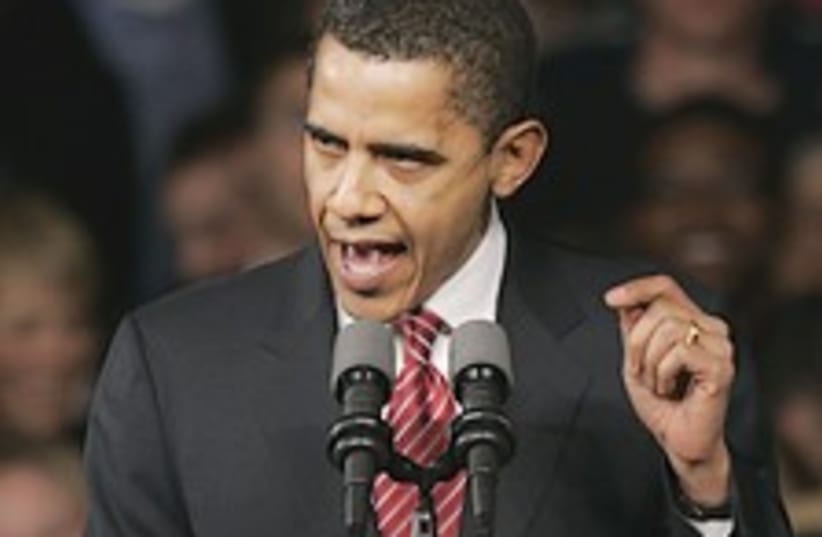As I sit in my biweekly Arabic lesson trying todecipher a complicated text, reciting the words like music -emphasizing the tedious final vowels - my teacher proudly smiles andsays, "Easy in training, difficult in battle. At least that's what thesoldiers used to tell me." This saying, in Hebrew, is looselytranslated to mean "practice makes perfect." So mindful is this teacherof the warlike mentality that she refers to my education as training,claiming that during my time at graduate school I "was trained to be awriter and trained in Arabic."
Overtime, this mentality has become a day-to-day reality here. In thecountry's 61 years of existence it has been involved in many wars. Itssurvival has always been dependent upon highly trained individuals.
Without the sweat and toil of its citizens, it is very possible that the country might not have survived to this day.
The lesson of "easy in training, difficult in battle" is onethat the Obama administration should learn from in its effort topromote democracy, human rights and freedom around the world.
From his very inception as president, Barack Obamarepresented a turning point in international affairs. From smallvillages in Egypt to bustling cities in Asia, Obama impressed hope uponpeople all over the world for a brighter future. For many, he is notmerely seen as an American president, he is a world leader who willrestore and resurrect the rule of law and freedom that we all so badlydesire.
With three simple words - "yes we can" - Obama promised torestore America's image from the often scorned policies of his Bushadministration predecessors.
INA world where actions speak louder than words, Obama has madesignificant efforts to advance the moral principles we aspire to.Presidential orders to shut down Guantanamo Bay were immediatelysigned. New diplomatic initiatives dealing with North Korea, Iran andother nuclear would-be threats are being undertaken. Suspectedterrorists such as Khalid Sheikh Mohammed - the self-proclaimedmastermind behind the 9/11 terrorist attack - have been given fairtrials in American courts. In fact, they have even been given Americanlawyers to represent their interests.
Even after the Fort Hood massacre Obama did notwaste an instant in reminding the world that "no faith justifies thesemurderous and craven acts." These attacks were committed by "twistedlogic" and were not representative of the doctrines of any onereligion." Obama's efforts have demonstrated to the world theimportance of freedom and the rule of law.
Yet, despite Obama's valiant efforts to actualize ourprinciples, Iran with its nuclear ambitions is closer to acquiring anuclear arsenal. It has not bought into our international principles.In fact, its leadership has used the unwieldy time it takes forinternational diplomacy to take effect to further the development ofits nuclear program.
Meanwhile, religious extremists are committing terroristattacks in the US - even at heavily guarded army bases. And even underthe due process of law suspected terrorists such as would-be ChristmasDay bomber Abdul Farouk Abdulmutallab fail to participate in theirhearings. Our principles of freedom and the rule of law are heard; but,they are not being universally accepted.
The Obama administration has taken the first few steps inadvancing humanistic principles throughout the world. First, Obama hasinjected people everywhere with hope for the future. Second, he hastaken actions to actualize these principles. However, these two stepshave still not produced the desired results.
Obama claims that "change will not come if we wait for someother person or some other time. We are the ones we've been waitingfor. We are the change that we seek." However, our views of freedom andthe rule of law are far from being universally accepted. Convincingpeople to give way to our beliefs will not come with the click of apen.
To turn our ideals into reality we must undertake the difficulttask of understanding the way our adversaries think. We must work hardto show them how freedom, human rights and democracy should prevail.
We must not allow the goodness of our principles to be used against us. Change is possible; but it involves hard work.
Prior to moving to Israel, the writer served as the specialassistant to the Critic of International Cooperation in the CanadianHouse of Commons. In Israel, he has researched, written and editedpapers for some of Israel's leading think tanks. He iscurrentlycompleting his thesis about modern reform in the Arab MiddleEast at the Interdisciplinary Center in Herzliya.
